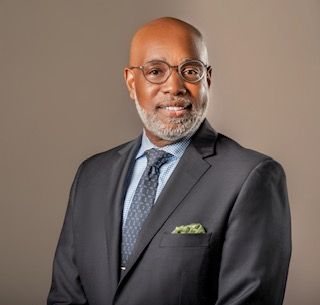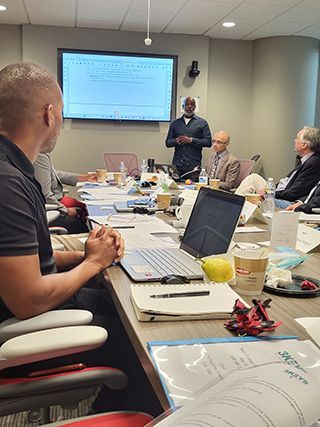3Keys exists for a single purpose: to end chronic homelessness. With early support from private citizens and from former First Lady Rosalynn Carter, 3Keys was founded to enable the homeless population to achieve dignity and self-sufficiency while living with and treating their mental illness.
Enterprise spoke with 3Keys President and CEO Scott Walker to dig deeper into their work.
Could you tell us a little bit about the work that you do at 3Keys?

Scott Walker: As the President/CEO of 3Keys, I work with all aspects of the organization.
My days can find me meeting with stakeholders discussing the importance of housing in metropolitan Atlanta and within hours being onsite working to assess our properties for continued service to our clients. When you are the leader of a nonprofit, every day is an adventure! 3Keys is one of Atlanta’s largest permanent supportive housing providers serving individuals with mental health diagnoses. We manage, own, and operate five properties and also have a scattered-site program totaling just under 500 units of housing. Supportive services are provided at each location to ensure the stability and connection to resources our residents need to be successful and self-sufficient.
How are HUD Section 4 Capacity Building funds used at your organization? What do you hope to accomplish with this funding?
SW: We structured our agreement to focus on a mix of direct capacity support to our residents, as well as capacity building for our organization. Certainly, our residents feel the biggest impact from the development of our onsite supportive services at Welcome House, our largest property located in downtown Atlanta. However, our work on the development and implementation of our recently completed three-year strategic plan, as well as the transition to a new IT platform, will also have a major impact. Section 4 funding will enable us to create a new path forward for 3Keys including improvement of operational processes and systems that are critical for our ongoing success. Our goal is to be relevant in the efforts to build and preserve affordable housing.
How have the last 2-3 years challenged you at 3Keys? What has been the hardest part for you and the organization? For those you serve?

SW: My tenure as the President/CEO of 3Keys began in January of 2022, and I have spent the last two years working to honor the hard work that had been done before me. I have also been focused on bringing a critical eye to the organization to identify where we need to shift our focus to meet the constantly changing landscape of affordable housing. Coming into this role fresh out of the active part of the pandemic has certainly brought its challenges. Supporting our residents through this crisis has taken a huge effort on our part to recruit and retain qualified staff as well as to maintain our very important community partnerships. Our team has been able to stabilize and meet the needs of our residents. We have constantly sought ways to offer support to them, including providing intensive case management, offering effective property management, and sustaining connections to community partners as needed. As to be expected, our residents’ mental health needs have been more challenging these past three years, but our staff has consistently been present, offering them amazing support.
What have you learned in this unique and challenging time? Will you make any permanent changes going forward?
SW: Through the pandemic, 3Keys was able to pivot and identify what was needed to bolster our support services team even further. We are currently looking at partnering with new providers for some additional clinical support at our properties. Our plan is to grow our internal supportive services team – first, with a pilot at Welcome House, hiring a program manager, case managers, and peer-support staff. As the organization had to pivot to determine the best way to support our residents, it became abundantly clear that we needed a qualified team – whether through an internal or an external partnership – that could be available to address the challenges and needs of our residents. We are excited about these new opportunities and enhanced ways to support our residents where the need is greatest. We know that the way we do business post-pandemic has drastically changed, and we are focused on an effective response.
What do you think will change about affordable housing over the next 5 years? How are you excited about 3Keys impacting that change?
SW: I think as we continue to grow in the post-pandemic years, it will be vital to think outside the box about innovative approaches to affordable housing. 3Keys is committed to being a part of this important conversation nationally. An important question is how can access be provided for individuals at all income levels to secure housing? Our goal is to expand our portfolio of units, but along with that, we want to offer communities that are safe and thriving. It is my hope that we will benefit from funding initiatives rolling out from the federal government as well as partners like Enterprise, to increase our capacity to provide quality housing and the needed support services. I am excited that 3Keys will be an integral part of that process.
What else should people know about 3Keys? What makes 3Keys unique as an organization in the affordable housing arena?
SW: We will be embarking on a complete rehabilitation project of O’Hern House in the MLK Historic District, utilizing a grant from the Governor’s Office (American Rescue Plan Funds) beginning in the fourth quarter of 2023. We eagerly look forward to increasing our overall capacity to provide affordable housing options in Atlanta and the state of Georgia in the coming years.
3Keys is unique in the non-profit space because we manage, own, and operate our properties. We believe housing is a first step to stability for our residents, but we know it’s not “housing only.” A strong supportive service model is integral to our success. 3Keys has been and will continue to be a consistent presence in the affordable housing arena. We hope to be a model for other agencies seeking to provide services similar to what we currently provide to our residents.